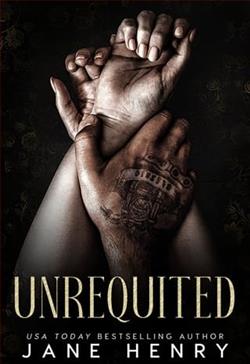Page 246 of The Daughters of Avalon
Rather, it was a story about queens.
Three, to be precise.
First, the Empress Matilda, whose mother kicked up her toes when she was only sixteen, and whose father left her with an uncertain legacy.
The Queen Consort, whose husband was a usurper, and who, no matter how hard she tried, never outran her cousin’s shadow, even in death.
And lastly, the Witch Queen, who, spurned by a young maiden who’d resented her father’s paramours, grew spiteful and treacherous.
But so, it seemed, ifpolitikswere akin to a game of Queen’s Chess, for the time being, the queens were no longer in play on the board: one defeated, one deceased, one now missing.
A few years ago, on threat of excommunication, the Empress Matilda abandoned Devizes Castle and returned to her court in Rouen, leaving her son to assume her battles in England.
Last year, consumed by fever, the Queen Consort died, leaving her sovereign husband to rule without his greatest ally.
Alas, sadly for England, the last queen standing was the most treacherous of all… older by far than Wales, more elusive than a will-o’-the-wisp, more deadly than a fork-tongued adder, Morwen was out there… somewhere, though she’d yet toresurface after Maude’s death—not because she was aggrieved, Giles suspected. Those two were enemies more than allies, despite that the Queen enabled Morwen as much as her husband did. After all, it was the Queen’s indefatigable desire to see her son consecrated that had kept the Welsh witch by her husband’s side, whispering like a viper into his ear. Mercifully, the one thing Morwen no longer had was Stephen’s ear. Nor was his son the heir apparent.
At twenty, Duke Henry was now favored for succession. As the true heir to England’s crown by virtue of his father and grandfather, the Vatican preferred to see Matilda’s elder-born consecrated over his mother or Stephen’s son.
As it stood, barring some unforeseen catastrophe, King Stephen would retain his throne until the event of his death, and thereafter, it would fall to Duke Henry.
At long last, after nineteen years of anarchy, the nation was prepared to settle. Only, naturally, there was one person who was not so pleased by the recent arbitration…
According to the missive, the King’s son left Wallingford in a rage, with a handful of barons who couldn’t stomach the thought of seeing an Angevin on the throne.
Much to Giles’s disgust, at six and twenty, Stephen’s elder-born was no more than a spoilt wretch, and this latest tantrum was yet another example of why no one with half a brain should ever trust him. Add that to his affiliation with Morwen, and it was a dangerous brew.
But this was the true danger of Morwen; her agenda was not Eustace’s agenda, nor was it King Stephen’s. Hers was a far, far more nefarious scheme, and if there was one thing Giles had come to understand, it was that she would do nothing that didn’t serve her purposes.
The King’s son was only a distraction.
Hoping to seize the fool before he did more damage, he and Wilhelm rode south with all due haste, stopping only now and again to rest their horses.
It was dusk on the seventh night, when they arrived at Bury St. Edmunds, greeted by the scent of charred grain and earth.
Mercifully, the stench of blistered flesh was absent from the milieu. Black-faced with ash, the entire flock could be found in the fields, salvaging what little remained—spring crops that would yield no ale, but at least the fire, far from prescribed, would improve the health of the field.
Abbot Ording rushed to greet them. “My lords,” he cried. “Welcome! Welcome!”
Giles alone dismounted, swinging one leg over his saddle to plant his feet on the ground. “He’s gone?”
There was no need to say who.
Ording crossed himself and kissed the tip of a thumb. “Aye, my lords. He took to his mount in a fit of rage after he realized most of the coffers had no keys.”
“No keys?”
“Well, my lord,” he said, his cheeks blooming red. “Therearekeys, of course. However, only one brother may ever be apprised where they are kept. We… er… locked him in the silo when the King’s son arrived. Verily, ’tis far simpler to make away with a single pricket than coffers full of gold.” The man crossed himself again. “Even so, he took a cartload, but we hadn’t another cart available for use—we burned them all in the barn,” he said behind a hand. “So, he set fire to the fields in retribution, all the while cursing over Angevin hell spawns.”
He was referring to Duke Henry, whose father was Angevin by birth. Giles re-examined the fields, his gaze finding the barn, which was also destroyed. It was difficult to say who’d wrought the most damage on this abbey—the monks themselves, or the Prince and his cronies.
Mounted and silent, his brother studied the blackened fields, swallowing visibly—no doubt recalling the burning at Warkworth, where Wilhelm, alone, had hauled out their dead. “Bastard,” his brother said low. “I’d like to set fire to his arse.”
Abbot Ording started over the blasphemy, crossing himself again. “My lord! You mustn’t say so: two wrongs do not make a right,” the priest scolded. “You wouldst do far better to pray for the prince’s soul.”
“Youpray for his soul,” countered Wilhelm. “I’d sooner give the stupid cunt something to pray about.”
At six-foot-five and weighing more than sixteen stone, Wilhelm’s threat was hardly innocuous. Abbot Ording shuffled closer to Giles, although in truth, he should have worried more over Giles… if only he knew.















